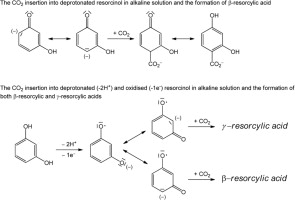These are a few points I'd like to add in addition to Waylander's answer for readers' benefits:
It is true that $\beta$-resorcylic acid (2,4-dihydroxybenzoic acid) is the major product of this reaction (option 2),a significant amount of $\gamma$-resorcylic acid (2,6-dihydroxybenzoic acid) would also form (option 1). For example, heating resocinol (1,3-dihydroxybenzene) with excess $\ce{KHCO3}$ or $\ce{NaHCO3}$ in water had afforded $\beta$-resorcylic acid exclusively, and $\ce{KHCO3}$ had given higher yield (Ref.1). As Waylander pointed out, the proportions are dependent on conditions, specifically by excessive heating (Ref.1). According to the authors, about 80% $\gamma$-resorcylic acid tends to be decarboxylated. And also, with 20% sodium hydroxide solution, it afforded some $\gamma$-resorcylic acid but considerable decarboxylation occurred simultaneously. This effect on base to give more $\gamma$-resorcylic acid is evident in Ref.2, which speculate formation of dianion would be the reason.
Further, $\beta$-resorcylic acid also tends to be decarboxylated in organic solvents above $\pu{150 ^\circ C}$ to give resocinol (First order kinetics; Ref.3 & Ref.4).
References:
- D. K. Hale, Audrey R. Hawdon, J. Idris Jones, D. I. Packham, "The carboxylation of resorcinol and the separation of β-and γ-resorcylic acid by ion-exchange chromatography," J. Chem. Soc. 1952, 3503-3509 (https://doi.org/10.1039/JR9520003503).
- Vincenzo Barbarossa, Francesco Barzagli, Fabrizio Mani, Sarah Lai, Giuseppina Vanga, "The chemistry of resorcinol carboxylation and its possible application to the $\ce{CO2}$ removal from exhaust gases," Journal of $\ce{CO2}$ Utilization 2015, 10, 50-59 (https://doi.org/10.1016/j.jcou.2015.04.004).
- Louis Watts Clark, "The kinetics of the decarboxylation of β-resorcylic acid in amines and glycols," J. Phys. Chem. 1963, 67(12),2831-2833 (https://doi.org/10.1021/j100806a078).
- M. A. Haleem, M. A. Hakeem, "The kinetics of the decarboxylation of β-resorcylic acid in catechol," Australian Journal of Chemistry 1976, 29(2),443-446 (https://doi.org/10.1071/CH9760443).

